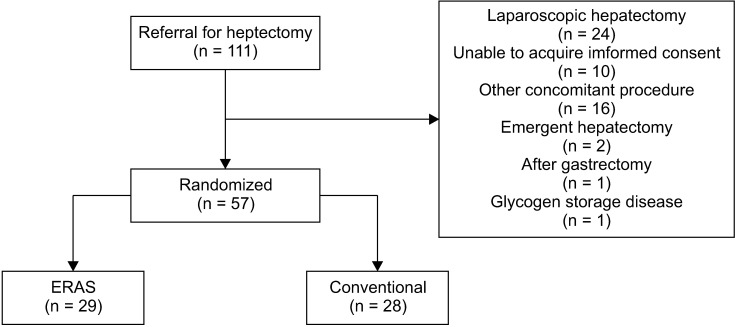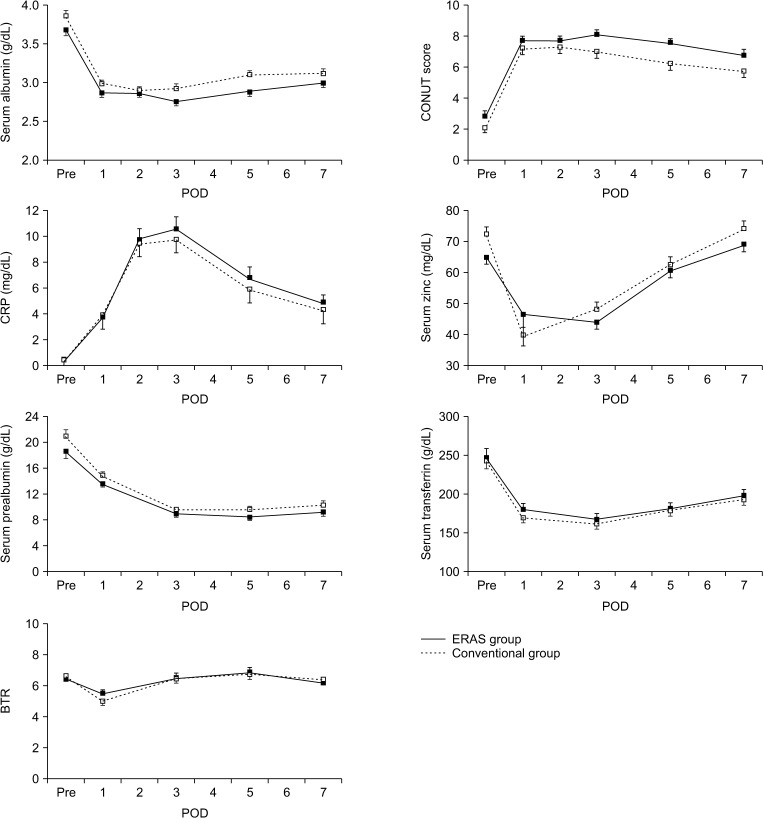Ann Surg Treat Res.
2020 Dec;99(6):320-328. 10.4174/astr.2020.99.6.320.
Effect of enhanced recovery after surgery protocol on recovery after open hepatectomy: a randomized clinical trial
- Affiliations
-
- 1Department of Surgery, Tohoku University Graduate School of Medicine, Sendai, Japan
- KMID: 2508931
- DOI: http://doi.org/10.4174/astr.2020.99.6.320
Abstract
- Purpose
Enhanced recovery after surgery (ERAS) is beneficial to patients undergoing digestive surgery. However, its efficacy in patients undergoing open hepatectomy remains unclear.
Methods
Consecutive patients scheduled for open hepatectomy were randomly assigned to undergo either ERAS or conventional postoperative management. The primary endpoint was the amount of time that elapsed before patients were considered medically fit for discharge (MFD) and length of hospital stay (LOHS). Secondary endpoints included morbidity, mortality, the time to first flatus, defecation, first walk, and freedom from infusion. Perioperative serum nutritional markers, insulin resistance, respiratory quotient (RQ), and resting energy expenditure (REE) were also assessed.
Results
Between August 2014 and March 2017, 57 patients were randomized into 2 groups; ERAS group (n = 29) and conventional management (n = 28). The median MFD was not significantly different between the ERAS and conventional management groups (6.5 vs. 7 days; P = 0.381). Recovery from gastrointestinal paresis was significantly quicker in the ERAS group (1.8 vs. 2.4 days; P = 0.004). There were no significant differences in serum markers, insulin resistance, RQ, and REE.
Conclusion
This trial did not demonstrate greater efficacy of the ERAS protocol following open hepatectomy in terms of the MFD and LOHS. However, the ERAS protocol was associated with better recovery from postoperative gastrointestinal paresis, suggesting that it is useful for patients undergoing open hepatectomy.
Keyword
Figure
Reference
-
1. Lassen K, Coolsen MM, Slim K, Carli F, de Aguilar-Nascimento JE, Schäfer M, et al. Guidelines for perioperative care for pancreaticoduodenectomy: Enhanced Recovery After Surgery (ERAS®) Society recommendations. Clin Nutr. 2012; 31:817–830. PMID: 23079762.2. Martin D, Roulin D, Grass F, Addor V, Ljungqvist O, Demartines N, et al. A multicentre qualitative study assessing implementation of an Enhanced Recovery After Surgery program. Clin Nutr. 2018; 37:2172–2177. PMID: 29129637.3. Lv L, Shao YF, Zhou YB. The enhanced recovery after surgery (ERAS) pathway for patients undergoing colorectal surgery: an update of meta-analysis of randomized controlled trials. Int J Colorectal Dis. 2012; 27:1549–1554. PMID: 23001161.4. Ota H, Ikenaga M, Hasegawa J, Murata K, Miyake Y, Mizushima T, et al. Safety and efficacy of an “enhanced recovery after surgery” protocol for patients undergoing colon cancer surgery: a multi-institutional controlled study. Surg Today. 2017; 47:668–675. PMID: 27688031.5. Wei AC, Greig PD, Grant D, Taylor B, Langer B, Gallinger S. Survival after hepatic resection for colorectal metastases: a 10-year experience. Ann Surg Oncol. 2006; 13:668–676. PMID: 16523369.6. Melloul E, Hübner M, Scott M, Snowden C, Prentis J, Dejong CH, et al. Guidelines for perioperative care for liver surgery: Enhanced Recovery After Surgery (ERAS) Society recommendations. World J Surg. 2016; 40:2425–2440. PMID: 27549599.7. Sánchez-Pérez B, Aranda-Narváez JM, Suárez-Muñoz MA, Eladel-Delfresno M, Fernández-Aguilar JL, Pérez-Daga JA, et al. Fast-track program in laparoscopic liver surgery: theory or fact? World J Gastrointest Surg. 2012; 4:246–250. PMID: 23493957.8. Dunne DF, Yip VS, Jones RP, McChesney EA, Lythgoe DT, Psarelli EE, et al. Enhanced recovery in the resection of colorectal liver metastases. J Surg Oncol. 2014; 110:197–202. PMID: 24715651.9. Kaibori M, Matsui K, Ishizaki M, Iida H, Yoshii K, Asano H, et al. Effects of implementing an “enhanced recovery after surgery” program on patients undergoing resection of hepatocellular carcinoma. Surg Today. 2017; 47:42–51. PMID: 27165267.10. Fujio A, Miyagi S, Tokodai K, Nakanishi W, Nishimura R, Mitsui K, et al. Effects of a new perioperative enhanced recovery after surgery protocol in hepatectomy for hepatocellular carcinoma. Surg Today. 2020; 50:615–622. PMID: 31797128.11. Ignacio de Ulíbarri J, González-Madroño A, de Villar NG, González P, González B, Mancha A, et al. CONUT: a tool for controlling nutritional status. First validation in a hospital population. Nutr Hosp. 2005; 20:38–45.12. Hayashi Y, Takayama T, Yamazaki S, Moriguchi M, Ohkubo T, Nakayama H, et al. Validation of perioperative steroids administration in liver resection: a randomized controlled trial. Ann Surg. 2011; 253:50–55. PMID: 21233606.13. Dindo D, Demartines N, Clavien PA. Classification of surgical complications: a new proposal with evaluation in a cohort of 6336 patients and results of a survey. Ann Surg. 2004; 240:205–213. PMID: 15273542.14. Matthews DR, Rudenski AS, Burnett MA, Darling P, Turner RC. The half-life of endogenous insulin and C-peptide in man assessed by somatostatin suppression. Clin Endocrinol (Oxf). 1985; 23:71–79. PMID: 2863015.15. Dunn DC, Harrison AL, Curtice C, DeLand S, Donnelly B, Fujioka E, et al. The importance of migratory connectivity for global ocean policy. Proc Biol Sci. 2019; 286:20191472. PMID: 31551061.16. Hausel J, Nygren J, Lagerkranser M, Hellström PM, Hammarqvist F, Almström C, et al. A carbohydrate-rich drink reduces preoperative discomfort in elective surgery patients. Anesth Analg. 2001; 93:1344–1350. PMID: 11682427.17. Jones C, Kelliher L, Dickinson M, Riga A, Worthington T, Scott MJ, et al. Randomized clinical trial on enhanced recovery versus standard care following open liver resection. Br J Surg. 2013; 100:1015–1024. PMID: 23696477.18. van Dam RM, Hendry PO, Coolsen MM, Bemelmans MH, Lassen K, Revhaug A, et al. Initial experience with a multimodal enhanced recovery programme in patients undergoing liver resection. Br J Surg. 2008; 95:969–975. PMID: 18618897.19. Pessaux P, Regimbeau JM, Dondéro F, Plasse M, Mantz J, Belghiti J. Randomized clinical trial evaluating the need for routine nasogastric decompression after elective hepatic resection. Br J Surg. 2007; 94:297–303. PMID: 17315273.20. Hendry PO, van Dam RM, Bukkems SF, McKeown DW, Parks RW, Preston T, et al. Randomized clinical trial of laxatives and oral nutritional supplements within an enhanced recovery after surgery protocol following liver resection. Br J Surg. 2010; 97:1198–1206. PMID: 20602497.21. Sugawara G, Nagino M, Nishio H, Ebata T, Takagi K, Asahara T, et al. Perioperative synbiotic treatment to prevent postoperative infectious complications in biliary cancer surgery: a randomized controlled trial. Ann Surg. 2006; 244:706–714. PMID: 17060763.22. Rayes N, Pilarski T, Stockmann M, Bengmark S, Neuhaus P, Seehofer D. Effect of pre- and probiotics on liver regeneration after resection: a randomised, double-blind pilot study. Benef Microbes. 2012; 3:237–244. PMID: 22968413.23. Usami M, Miyoshi M, Kanbara Y, Aoyama M, Sakaki H, Shuno K, et al. Effects of perioperative synbiotic treatment on infectious complications, intestinal integrity, and fecal flora and organic acids in hepatic surgery with or without cirrhosis. JPEN J Parenter Enteral Nutr. 2011; 35:317–328. PMID: 21527594.24. Wu XD, Liu MM, Liang X, Hu N, Huang W. Effects of perioperative supplementation with pro-/synbiotics on clinical outcomes in surgical patients: a meta-analysis with trial sequential analysis of randomized controlled trials. Clin Nutr. 2018; 37:505–515. PMID: 27836310.25. Soop M, Nygren J, Myrenfors P, Thorell A, Ljungqvist O. Preoperative oral carbohydrate treatment attenuates immediate postoperative insulin resistance. Am J Physiol Endocrinol Metab. 2001; 280:E576–E583. PMID: 11254464.26. Kobayashi A, Kaido T, Hamaguchi Y, Okumura S, Taura K, Hatano E, et al. Impact of postoperative changes in sarcopenic factors on outcomes after hepatectomy for hepatocellular carcinoma. J Hepatobiliary Pancreat Sci. 2016; 23:57–64. PMID: 26572789.27. Okumura S, Kaido T, Hamaguchi Y, Fujimoto Y, Kobayashi A, Iida T, et al. Impact of the preoperative quantity and quality of skeletal muscle on outcomes after resection of extrahepatic biliary malignancies. Surgery. 2016; 159:821–833. PMID: 26603849.
- Full Text Links
- Actions
-
Cited
- CITED
-
- Close
- Share
- Similar articles
-
- ERAS in minimally invasive hepatectomy
- Which patients with gastric cancer should be candidates for Enhanced Recovery After Surgery protocols?
- National survey of Korean hepatobiliary-pancreatic surgeons on attitudes about the enhanced recovery after surgery protocol
- Enhanced recovery after surgery strategy for cirrhosis patients undergoing hepatectomy: experience in a single research center
- Safety and efficacy of enhanced recovery after surgery (ERAS) program after donor hepatectomy: a propensity-matched analysis





